Israel to agree unofficially to Egypt cease-fire deal; skeptical Barak to discuss plan with Mubarak Monday
By Amos Harel and Barak Ravid, Haaretz, May 19, 2008
Israel plans to accept the Egyptian-mediated cease-fire proposal with Hamas in the Gaza Strip, but does not intend to officially declare a commitment to it. Instead, Israel will treat the deal struck indirectly with Hamas as a series of steps beginning with a lull in hostilities, followed by gradual relaxation of the financial blockade of Gaza.
Ehud Barak, who will discuss the cease-fire with Egyptian President Hosni Mubarak in Sharm el-Sheikh Monday, is skeptical about the chances of achieving long-term quiet with Hamas, and his feelings are shared by Prime Minister Ehud Olmert and Foreign Minister Tzipi Livni.
However, Barak, who will be attending the World Economic Forum, is set to tell Mubarak and Egyptian intelligence chief Omar Suleiman that Israel is prepared to stop its military activities in Gaza if Hamas stops firing rockets at Israel. Israel will also try to get Egypt to step up efforts to stop weapons from being smuggled into Gaza. Barak is also expected to say that Israel will lift the blockade and open border crossings only if progress is made on talks aimed at releasing captive soldier Gilad Shalit.
Once quiet reigns, Israel hopes to gradually raise the number of trucks allowed to bring goods into the Strip (only about 60 trucks a day, on average, are now allowed in). If a deal is reached on returning Shalit, in exchange for Israel’s release of 450 prisoners, Israel would also agree to reopen the Rafah crossing, essentially lifting the blockade almost completely. [complete article]
Is Israel breaking its own taboo on talks with Hamas?
By Amos Harel, Haaretz, May 18, 2008
Participants at a recent inner cabinet meeting were listening to details of the Egyptian mediation initiative between Israel and Hamas on a cease-fire in the Gaza Strip recently, when a senior minister reportedly reminded those present that Israel does not negotiate, directly or indirectly, with Hamas. Shin Bet security service head Yuval Diskin interrupted, saying there was no other way to describe the talks.
A letter to Prime Minister Ehud Olmert, Defense Minister Ehud Barak and Foreign Minister Tzipi Livni, the details of which were revealed Friday, called for the indirect and secret talks with Hamas to be recognized. As for Israel’s greatest concerns – that Hamas will use a lull in hostilities to rearm and that Egypt’s promises to fight weapons smuggling bear no weight – the writers of the letter offered no solution.
Among the signatories’ names, that of MK Yossi Beilin (Meretz) is to be expected. More surprising are the names of the former Shin Bet chief Ephraim Halevi, who has actually been calling for talks with Hamas in recent months, along with former chief of staff Amnon Lipkin-Shahak and Brigadier General (res.) Shmuel Zakai, a former Gaza Division commander. This is an attempt to provide a military stamp of approval to a step Israel has officially sworn it would not take. What was taboo two years ago is no longer. [complete article]
— There’s one thing that George Bush, John McCain, and Barak Obama all currently claim: talking to Hamas is a bad idea. So what do they each have to say about the fact that Israel has abandoned this principle?
The Israelis are doing lots of posturing – claiming that talks have not been negotiations, saying that they won’t express their official commitment to a ceasefire with Hamas – but the reality is clear: the policy of attempting to defeat Hamas through a war of attrition has failed.
The presidential campaigns and the American press will of course all press along as though nothing has changed.
Israel’s ‘American problem’
By Jeffrey Goldberg, New York Times, May 18, 2008
When the prime minister of Israel, Ehud Olmert, arrived at a Jerusalem ballroom in February to address the grandees of the Conference of Presidents of Major American Jewish Organizations (a redundancy, since there are no minor American Jewish organizations), he was pugnacious, as is customary, but he was also surprisingly defensive, and not because of his relentlessly compounding legal worries. He knew that scattered about the audience were Jewish leaders who considered him hopelessly spongy — and very nearly traitorous — on an issue they believed to be of cosmological importance: the sanctity of a “united” Jerusalem, under the sole sovereignty of Israel.
These Jewish leaders, who live in Chicago and New York and behind the gates of Boca Raton country clubs, loathe the idea that Mr. Olmert, or a prime minister yet elected, might one day cede the Arab neighborhoods of East Jerusalem to the latent state of Palestine. These are neighborhoods — places like Sur Baher, Beit Hanina and Abu Dis — that the Conference of Presidents could not find with a forked stick and Ari Ben Canaan as a guide. And yet many Jewish leaders believe that an Israeli compromise on the boundaries of greater Jerusalem — or on nearly any other point of disagreement — is an axiomatic invitation to catastrophe.
One leader, Joshua Katzen, of the Jewish Institute for National Security Affairs, told me, “I think that Israelis don’t have the big view of global jihad that American Jews do, because Israelis are caught up in their daily emergencies.” When I asked him how his Israeli friends responded to this, he answered: “They say, ‘When your son has to fight, you can have an opinion.’ But I tell them that it is precisely because your son has to fight that you have a harder time seeing the larger picture.”
When I spoke to Mr. Olmert a few days after his meeting with the Conference of Presidents, he made only brief mention of his Diaspora antagonists; he said that certain American Jews he would not name have been “investing a lot of money trying to overthrow the government of Israel.” But he was expansive, and persuasive, on the Zionist need for a Palestinian state. Without a Palestine — a viable, territorially contiguous Palestine — Arabs under Israeli control will, in the not-distant future, outnumber the country’s Jews. [complete article]
— We hear a lot about the existential threats that Israel faces, but an American plot to overthrow the government of Israel? And the accusation comes from the Israeli prime minister? Shouldn’t that be headline news?


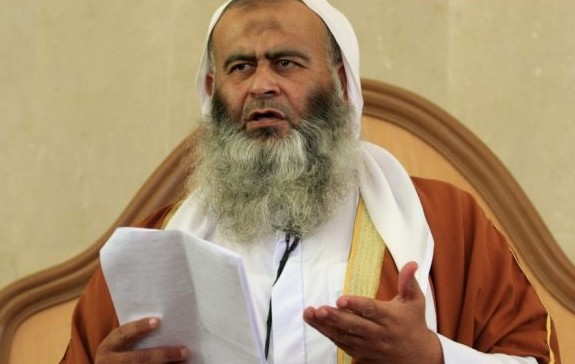
 uring Israel’s recent Gaza offensive, Israeli soldiers unlawfully shot and killed 11 Palestinian civilians, including five women and four children, who were in groups waving white flags to convey their civilian status, Human Rights Watch said in a report released today. The Israeli military should conduct thorough, credible investigations into these deaths to tackle the prevailing culture of impunity, Human Rights Watch said.
uring Israel’s recent Gaza offensive, Israeli soldiers unlawfully shot and killed 11 Palestinian civilians, including five women and four children, who were in groups waving white flags to convey their civilian status, Human Rights Watch said in a report released today. The Israeli military should conduct thorough, credible investigations into these deaths to tackle the prevailing culture of impunity, Human Rights Watch said.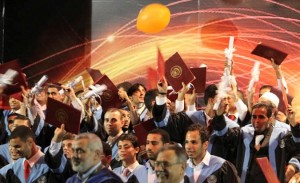 pending a few weeks in Gaza and seeing the full extent of the Hamas media control in Gaza, you can’t help but notice the success of Hamas and its propaganda efforts in the Palestinian territories and beyond. As someone who does not hold much affection toward Hamas and its ideology (their militia killed my first cousin and mutilated his body in front of cameras) I have to give credit where credit is due:
pending a few weeks in Gaza and seeing the full extent of the Hamas media control in Gaza, you can’t help but notice the success of Hamas and its propaganda efforts in the Palestinian territories and beyond. As someone who does not hold much affection toward Hamas and its ideology (their militia killed my first cousin and mutilated his body in front of cameras) I have to give credit where credit is due: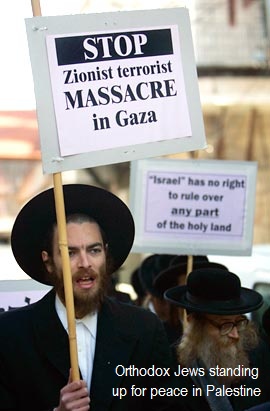 e had no choice,” has become Israel’s national mantra.
e had no choice,” has become Israel’s national mantra.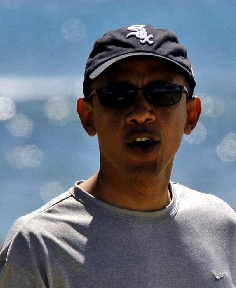 s the incoming president, world-renowned for his eloquence, about to become better known for his silence?
s the incoming president, world-renowned for his eloquence, about to become better known for his silence?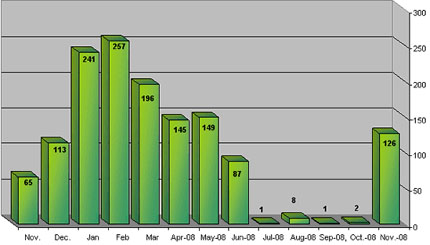
 28 and 29 February: the US parks the USS Cole off the shore of Lebanon. Uh-oh.
28 and 29 February: the US parks the USS Cole off the shore of Lebanon. Uh-oh.